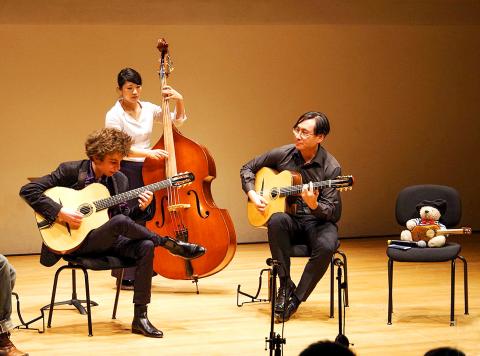Vincent Tsai (蔡偉靖) wanted to bring gypsy jazz to Taiwan ever since he visited France to attend the Festival Django Reinhardt, named after the legendary guitarist who died in 1953 but continues to inspire musicians to take up the genre today. In 2015, Tsai found the perfect person to help him put together the Taipei Gypsy Jazz Festival: Denis Chang (張宏睿), a Montreal native of Taiwanese descent who has learned from well-known gypsy jazz players such as Fapy Lafertin of Belgium and Ritary Gaguenetti of France.
Chang has put together an impressive international lineup for this year’s festival, recruiting violinist and singer Tcha Limberger from Belgium, guitarist Antoine Boyer from France and double-bassist Kumiko Imakyurei from Japan to hold workshops, jam nights and a finale concert on Sunday that pays tribute to Reinhardt.
While gypsy jazz is still relatively obscure in Taiwan, Chang says that he has played with the Dark Eyes Gypsy Jazz Band in Taipei in the past, always to enthusiastic response from the crowd. While Dark Eyes is the only band he knows in Taipei that is trying to recreate the music as it is originally played, Chang is open to fusing it with other styles — he says he would love to see people combine old Taiwanese swing with the genre.

Photo courtesy of Taipei Gypsy Jazz Festival
■ Django in Taiwan concert is on Sunday from 7:30pm to 9:30pm at Eslite Performance Hall (誠品表演廳), B2 Eslite Spectrum Shopping Mall, 88 Tobacco Factory Road, Taipei City (台北市菸廠路88號B2)
■ Tickets are NT$1,000, NT$1,200 and NT$1,500; for more information and full program, visit gypsyjazztaipei.weebly.com

Towering high above Taiwan’s capital city at 508 meters, Taipei 101 dominates the skyline. The earthquake-proof skyscraper of steel and glass has captured the imagination of professional rock climber Alex Honnold for more than a decade. Tomorrow morning, he will climb it in his signature free solo style — without ropes or protective equipment. And Netflix will broadcast it — live. The event’s announcement has drawn both excitement and trepidation, as well as some concerns over the ethical implications of attempting such a high-risk endeavor on live broadcast. Many have questioned Honnold’s desire to continues his free-solo climbs now that he’s a

Lines between cop and criminal get murky in Joe Carnahan’s The Rip, a crime thriller set across one foggy Miami night, starring Matt Damon and Ben Affleck. Damon and Affleck, of course, are so closely associated with Boston — most recently they produced the 2024 heist movie The Instigators there — that a detour to South Florida puts them, a little awkwardly, in an entirely different movie landscape. This is Miami Vice territory or Elmore Leonard Land, not Southie or The Town. In The Rip, they play Miami narcotics officers who come upon a cartel stash house that Lt. Dane Dumars (Damon)

Francis William White, an Englishman who late in the 1860s served as Commissioner of the Imperial Customs Service in Tainan, published the tale of a jaunt he took one winter in 1868: A visit to the interior of south Formosa (1870). White’s journey took him into the mountains, where he mused on the difficult terrain and the ease with which his little group could be ambushed in the crags and dense vegetation. At one point he stays at the house of a local near a stream on the border of indigenous territory: “Their matchlocks, which were kept in excellent order,

Today Taiwanese accept as legitimate government control of many aspects of land use. That legitimacy hides in plain sight the way the system of authoritarian land grabs that favored big firms in the developmentalist era has given way to a government land grab system that favors big developers in the modern democratic era. Articles 142 and 143 of the Republic of China (ROC) Constitution form the basis of that control. They incorporate the thinking of Sun Yat-sen (孫逸仙) in considering the problems of land in China. Article 143 states: “All land within the territory of the Republic of China shall